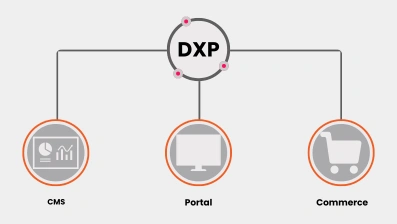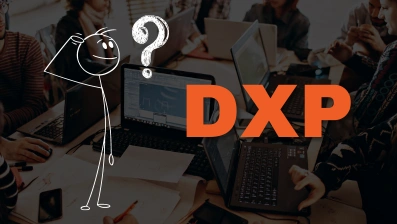Navigating the digital landscape requires choosing the right tools to manage and deliver content effectively. Understanding the differences between a Content Management System (CMS) and a Digital Experience Platform (DXP) is crucial for making an informed decision. This guide will help you explore the unique features, use cases, and benefits of each platform, ensuring you select the best solution to meet your business needs and enhance your digital strategy.
What is DXP?
A Digital Experience Platform (DXP) is an integrated suite of technologies designed to enable the composition, management, delivery, and optimization of personalized digital experiences across multiple channels.
Unlike traditional CMS platforms, DXPs provide a more holistic approach, combining content management with marketing, analytics, e-commerce, and customer relationship management functionalities.
DXPs aim to deliver seamless and engaging experiences tailored to individual user needs, thereby enhancing customer satisfaction and loyalty.
Top Features
Personalization: Deliver customized content and experiences based on user behavior and preferences.
Omnichannel Delivery: Manage and deliver content across various digital channels, including web, mobile, social media, and IoT devices.
Integration: Seamlessly integrate with third-party systems like CRM, ERP, and marketing automation tools.
Analytics and Insights: Gain deep insights into user behavior and campaign performance through comprehensive analytics.
Marketing Automation: Automate marketing workflows, lead nurturing, and customer engagement activities.
Use Cases
E-Commerce: Enhance the shopping experience with personalized product recommendations, targeted promotions, and streamlined checkout processes.
Healthcare: Provide personalized patient information, appointment scheduling, and telemedicine services across multiple channels.
Financial Services: Offer tailored financial advice, product recommendations, and secure transaction services.
Education: Deliver personalized learning experiences, course recommendations, and real-time feedback to students.
Best Suited For
Large Enterprises: Organizations that need to manage complex digital ecosystems and deliver personalized experiences at scale.
E-Commerce Businesses: Companies looking to enhance customer engagement and drive sales through personalized shopping experiences.
Healthcare Providers: Institutions aiming to improve patient engagement and streamline healthcare delivery across digital channels.
Educational Institutions: Schools and universities seeking to provide tailored learning experiences and improve student outcomes.
Examples
Adobe Experience Manager (AEM): A comprehensive DXP that integrates content management, marketing automation, and analytics.
Sitecore Experience Platform: Combines CMS capabilities with advanced personalization, marketing automation, and analytics.
Kentico Xperience: An all-in-one DXP that offers content management, digital marketing, and e-commerce functionalities.
By leveraging the capabilities of a DXP, businesses can create more engaging and personalized digital experiences, leading to higher customer satisfaction and better business outcomes.

What is CMS?
A Content Management System (CMS) is a software platform that allows users to create, manage, and modify digital content without needing specialized technical skills.
It simplifies the process of building and maintaining websites by providing an intuitive interface for content creators.
A CMS development separates the content from the design, enabling users to focus on producing and organizing content while the system handles the presentation.
This makes it easier for businesses to maintain an up-to-date online presence and manage their digital assets efficiently.
Top Features
User-Friendly Interface: An intuitive interface that allows non-technical users to create and edit content easily.
Content Editing Tools: Rich text editors, media management, and version control features to streamline content creation.
Template Management: Pre-designed templates to ensure consistent design and branding across the site.
SEO Tools: Built-in tools to optimize content for search engines, improving visibility and traffic.
Security: Features like user authentication, permissions, and regular updates to protect the site from vulnerabilities.
Use Cases
Corporate Websites: Manage and update company information, news, and events easily.
Blogs: Create and publish blog posts with multimedia content and social sharing options.
E-Commerce: Run online stores with product listings, shopping carts, and payment processing.
Educational Institutions: Provide course information, resources, and updates for students and faculty.
Non-Profits: Share organizational updates, manage events, and collect donations online.
Best Suited For
Small to Medium Businesses: Organizations that need a cost-effective way to manage their digital presence without extensive technical resources.
Bloggers and Content Creators: Individuals and teams focused on regularly publishing content.
E-Commerce Operators: Businesses looking to sell products online with a manageable and scalable platform.
Educational Institutions: Schools and universities that need to manage content and provide information to students and staff.
Examples
WordPress: The most popular CMS, known for its flexibility and extensive plugin ecosystem.
Joomla!: A CMS that offers a good balance between ease of use and advanced functionality.
Drupal: Known for its robustness and scalability, suitable for complex websites.
Kentico: Combines CMS features with integrated marketing tools, offering a comprehensive solution for businesses.
By leveraging the capabilities of a CMS, businesses and individuals can efficiently manage their digital content, maintain an engaging online presence, and achieve their communication and marketing goals.

Comparing CMS vs DXP
Understanding the differences between a Content Management System (CMS) and a Digital Experience Platform (DXP) is crucial for selecting the right tool for your business needs. Below is a detailed comparison table, followed by a deeper look into specific criteria.
| Criteria | CMS | DXP |
|---|---|---|
| Purpose | Manage and publish digital content | Manage, deliver, and optimize digital experiences |
| Core Functionality | Content creation, editing, and publishing | Content management, marketing, analytics, and e-commerce |
| Personalization | Limited | Advanced personalization based on user data |
| Integration | Basic integration capabilities | Extensive integration with third-party tools |
| User Experience | Focused on content creators | Focused on delivering personalized experiences |
| Analytics and Insights | Basic analytics | Comprehensive analytics and insights |
| Scalability | Suitable for smaller websites | Highly scalable for complex, multi-channel environments |
| Use Cases | Blogs, corporate websites, e-commerce | Large enterprises, multi-channel marketing, personalized customer experiences |
| Examples | WordPress, Joomla!, Drupal, Kentico | Adobe Experience Manager, Sitecore, Kentico Xperience |
Purpose
CMS: A CMS primarily focuses on content creation, management, and publishing. It is designed to make it easy for users to manage website content without requiring technical skills.
DXP: A DXP goes beyond content management by integrating tools for marketing, analytics, and e-commerce. It aims to deliver cohesive and personalized digital experiences across multiple channels, enhancing customer engagement and satisfaction.
Core Functionality
CMS: Core functionalities include content creation, editing, publishing, and template management. CMS platforms often provide basic SEO tools and media management features.
DXP: DXPs offer a comprehensive suite of tools, including content management, advanced personalization, marketing automation, analytics, and e-commerce functionalities. This integrated approach ensures seamless operations and better user experiences.
Personalization
CMS: Personalization capabilities in a CMS are usually limited. Some platforms offer basic personalization features based on user roles or content preferences.
DXP: DXPs excel in personalization, using advanced algorithms and user data to deliver tailored content and experiences. Personalization can be based on user behavior, preferences, demographics, and real-time interactions.
Integration
CMS: CMS platforms typically offer basic integration capabilities with plugins and extensions for added functionality.
DXP: DXPs are designed to integrate seamlessly with a wide range of third-party tools, such as CRM, ERP, marketing automation platforms, and analytics services. This extensive integration ensures a unified digital ecosystem.
User Experience
CMS: The primary focus is on providing a user-friendly interface for content creators to manage and publish content easily.
DXP: DXPs focus on delivering exceptional user experiences by personalizing content and interactions based on user data. The goal is to enhance engagement and drive conversions.
Analytics and Insights
CMS: CMS platforms offer basic analytics features to track website performance and user interactions.
DXP: DXPs provide comprehensive analytics and insights, enabling businesses to measure and optimize their digital strategies. Detailed reports and dashboards help track user behavior, campaign performance, and conversion rates.
Scalability
CMS: CMS platforms are suitable for small to medium-sized websites and businesses. They offer scalability to an extent but may struggle with very large or complex digital environments.
DXP: DXPs are highly scalable, designed to handle complex, multi-channel digital experiences. They can support large enterprises with diverse and extensive digital needs.
Use Cases
CMS: Ideal for blogs, corporate websites, small e-commerce sites, and educational institutions.
DXP: Best suited for large enterprises, e-commerce businesses, healthcare providers, financial services, and educational institutions needing advanced personalization and multi-channel delivery.
By understanding these differences, businesses can make an informed decision when choosing between a CMS and a DXP, ensuring they select the right platform to meet their digital goals and provide an exceptional user experience.
How To Choose The Right One For You
Choosing between a Content Management System (CMS) and a Digital Experience Platform (DXP) depends on your business needs, goals, and the complexity of your digital strategy. Here’s a guide to help you decide which platform is right for you:
Assess Your Business Needs
CMS:
Content-Centric Focus: If your primary need is to create, manage, and publish content, a CMS might be the best choice. CMS platforms are designed to simplify content management and make it accessible to non-technical users.
Simplicity: For small to medium-sized businesses with straightforward content management needs, a CMS provides a cost-effective and user-friendly solution.
Limited Personalization: If personalization is not a priority or you only need basic personalization features, a CMS will suffice.
DXP:
Comprehensive Digital Strategy: If your business requires a more holistic approach to digital experiences, including marketing, analytics, and e-commerce, a DXP is ideal. DXPs integrate these functionalities into a single platform, providing a seamless user experience.
Advanced Personalization: For businesses that need to deliver highly personalized content and experiences across multiple channels, a DXP offers advanced personalization capabilities.
Scalability: If you anticipate significant growth or need to manage complex digital ecosystems, a DXP’s scalability will support your long-term objectives.
Evaluate Your Technical Resources
CMS:
Ease of Use: CMS platforms are designed to be user-friendly, with intuitive interfaces that allow non-technical users to manage content easily.
Lower Technical Demands: If you have a smaller team or limited technical expertise, a CMS can be managed with fewer resources and less technical know-how.
DXP:
Technical Expertise Required: DXPs often require more technical expertise to implement and manage. If you have a dedicated IT team or access to technical resources, you can leverage the full capabilities of a DXP.
Complex Implementations: For businesses with complex digital strategies and the need for extensive integrations, a DXP is more suited to handle these demands.
Consider Your Budget
CMS:
Cost-Effective: CMS platforms are generally more affordable and offer lower upfront and ongoing costs, making them ideal for small to medium-sized businesses.
Basic Functionality: If your budget is limited and you only need basic content management features, a CMS will meet your needs without unnecessary expense.
DXP:
Investment in Advanced Capabilities: DXPs typically come with higher costs due to their extensive features and integrations. However, the investment can pay off with improved user experiences, better engagement, and higher conversion rates.
Long-Term Value: For businesses that plan to scale and require a comprehensive digital strategy, the long-term benefits of a DXP can outweigh the initial investment.
Identify Your Target Audience
CMS:
Content Publishers: Ideal for businesses where content is the primary focus, such as blogs, news sites, and informational websites.
Standard User Interactions: Suitable for websites where user interactions are relatively standard and do not require extensive personalization.
DXP:
Engagement and Conversion: Best for businesses that need to engage users deeply, personalize interactions, and drive conversions across multiple channels.
Complex User Journeys: For organizations with complex user journeys that span multiple touchpoints, a DXP provides the tools needed to manage and optimize these interactions.
By carefully assessing your business needs, technical resources, budget, and target audience, you can make an informed decision between a CMS and a DXP. Whether you opt for a simple content management system or a comprehensive digital experience platform, choosing the right tool will help you achieve your digital goals and deliver exceptional experiences to your users.
DotStark, Your Partner in Success
At DotStark, we specialize in helping businesses leverage the full potential of both CMS and DXP platforms.
As a leading Kentico Development Company, we offer tailored solutions that align with your specific needs, whether you're looking to manage simple content workflows or create immersive digital experiences.
Our expert team provides end-to-end services, from initial consultation and strategic planning to deployment and ongoing support.
We ensure your digital platform is optimized for performance, security, and scalability.
With DotStark, you can confidently navigate the complexities of the digital world and achieve your strategic goals.
Conclusion
Choosing between a CMS and a DXP depends on your business objectives, technical resources, and the complexity of your digital needs. By understanding the unique benefits and use cases of each platform, you can make a well-informed decision that aligns with your strategic goals. Whether you opt for a CMS to streamline content management or a DXP to deliver personalized digital experiences, selecting the right platform is key to your success.
Frequently Asked Questions
A CMS focuses on content creation, management, and publishing, while a DXP integrates content management with advanced marketing, analytics, and e-commerce functionalities to deliver personalized digital experiences.
A CMS is generally more suitable for small businesses due to its simplicity and cost-effectiveness. It provides the necessary tools for managing and publishing content without requiring extensive technical resources.
Yes, many CMS platforms offer plugins and extensions that allow integration with third-party marketing tools, such as email marketing platforms, SEO tools, and social media management tools.
A DXP enhances customer engagement by delivering personalized content and experiences based on user behavior and preferences. It uses advanced analytics and automation to tailor interactions across multiple channels.
Yes, migrating from a CMS to a DXP is possible. The process involves transferring content, configuring new integrations, and setting up personalization and marketing automation features. Professional assistance can ensure a smooth transition.
Key features to look for in a CMS include a user-friendly interface, robust content editing tools, template management, SEO capabilities, and strong security features.
Large enterprises should consider using a DXP because it offers scalability, advanced personalization, comprehensive analytics, and seamless integration with various business systems, enabling them to manage complex digital ecosystems effectively.
Yes, a DXP is designed to support multi-channel marketing, allowing businesses to deliver consistent and personalized experiences across websites, mobile apps, social media, and other digital channels.
Popular CMS platforms include WordPress, Joomla!, Drupal, and Kentico. Each offers different features and capabilities, catering to various business needs.
Deciding between a CMS and a DXP depends on your business goals, technical resources, budget, and the complexity of your digital strategy. Assess your needs for content management, personalization, integration, and scalability to make an informed decision. Consulting with a digital solutions provider like DotStark can also help determine the best fit for your organization.










 +91 9680599916
+91 9680599916
 vanshika@dotstark.com
vanshika@dotstark.com
